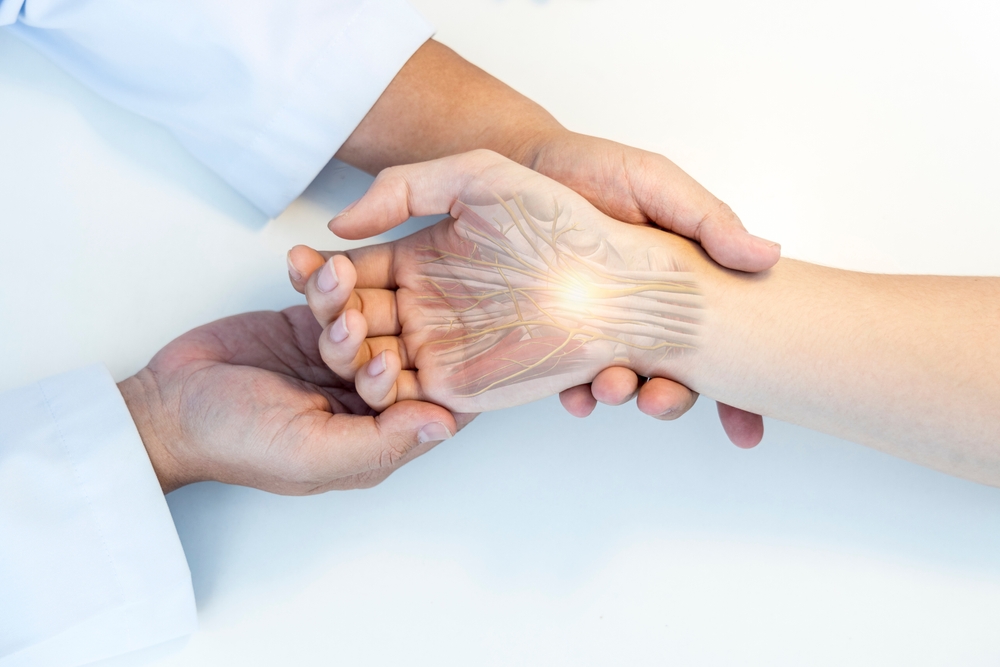
Nerve Injury in the Hand
Nerves are fragile and can be injured in many ways — including compression, lacerations, or blunt trauma. Compression is caused by prolonged pressure on a nerve, such as in carpal tunnel syndrome. Nerve lacerations are caused by a sharp object such as a knife or broken glass. A lacerated nerve in the finger will make it feel constantly numb often with tingling and electric pain. A nerve can also be injured by a sudden blunt force or “contusion” such as the thumb being hit with a hammer.

What Are Treatment Options for Nerve Injuries in the Hands?
Treatment of a nerve injury depends on the type of injury, timing of the injury, and specific nerve involved. Nerves which are contused due to blunt trauma will often recover function gradually on their own, if the nerve injury is not too severe. There are some oral medications which can be prescribed to reduce nerve pain, such as gabapentin. Hand therapy can help with finger stiffness, swelling, and hypersensitivity. Surgery may be recommended for nerve damage.
What Surgery is Recommended for Nerve Damage?
Surgery is recommended for most lacerated nerves in the hand in order to improve function and decrease the chance for neuroma formation. Without surgery, the two ends of the nerve have difficulty joining together and the numbness can be permanent. A neuroma is a thickened end of a cut nerve which can be hypersensitive to touch.
During nerve repair surgery, the nerve ends are brought back together and the nerve sheath is repaired using fine sutures. This is known as a “primary repair.” Magnification improves the ability to see the nerve and its tiny internal bundles called fascicles. Injured tendons are also repaired if needed. This surgery is ideally performed within a few days of the injury.
If a nerve is compressed, such as in carpal tunnel syndrome or cubital tunnel syndrome, simple surgical decompression can be helpful to improve the nerve function. This is called carpal tunnel release and cubital tunnel release surgery. If the nerve has been damaged before surgery, full nerve recovery is sometimes not possible.
What is a Nerve Graft?
If there has been a delay in treatment of a nerve laceration or if the nerve has been injured over a wide area, it may not be possible to bring the ends of the nerve back together. In this case a “nerve graft” can be used for nerve reconstruction to bridge the gap. There are many available sources for nerve graft reconstruction. The three most common ways to bridge the gap are:
Autografts
An autograft is a nerve graft obtained from the same patient’s body using another skin incision. Some numbness can be expected from the donor site, depending on the location of the graft. These can be obtained from the patient's leg, forearm, wrist, and other locations.
Allografts
An allograft is a nerve obtained from a person who has donated their body tissues. The grafts are cleaned and prepared carefully for this purpose. There is a very small risk of both disease transmission and graft rejection with use of allografts, but they do not require a second incision on the patient. These are commonly used today and have good results from treatment.
Synthetic Tubes
Synthetic hollow tubes are designed to guide the reconnection of nerve gaps. They do not require nerve harvesting from the patient but there is a small risk of graft rejection or infection with any manufactured material.
What is the Recovery Process After Nerve Injury Surgery?
Nerve repair surgery is not a “quick fix.” Recovery of the nerve is slow and can take 6-12 months for the feeling to come back. Recovery time varies among patients, depending on the severity of the injury, patient age, possible complications, and medical history of the patient. Not all patients regain full function after a nerve repair or reconstruction. Hand therapy is usually helpful following surgery to help with rehabilitation of the hand.
Restore Nerve Function in Your Hand. Discover Our Expert Solutions in Raleigh.
Nerve injuries in the hand can be concerning, affecting both sensation and mobility. Our specialized team of orthopedic surgeons at Raleigh Hand to Shoulder Center is here to provide up-to-date treatments to help you regain optimal nerve function in your hand. Please call our office to schedule an appointment or book a visit online today!

Updated 6/22/2025

